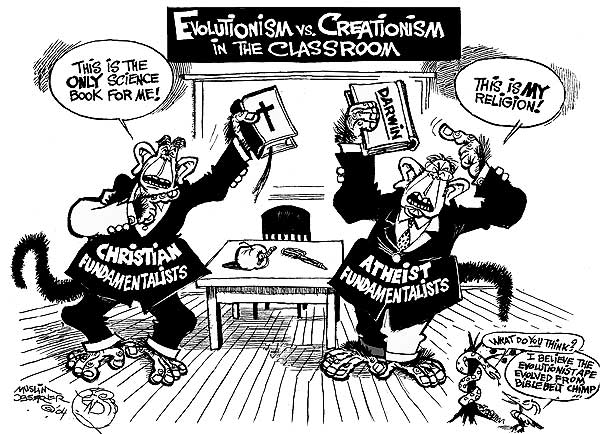
Controversial Issues
Since its debut on the intellectual scene, the idea of evolution has made waves. While, the idea of common ancestry is nothing new, its revival during the scientific revolution, and finally its official proposal as a serious scientific theory made by Darwin stirred many passionate feelings. Not only does the theory negate many formerly held beliefs, but its implications are such that many people do not wish to consider them. The major dissenters to the theory of evolution, at least in the United States, are Fundamentalist Christians who take the story of creation from Genesis literally, and have even attempted to have it be considered a scientific theory by teaching it in science classes. I personally believe that this is not the correct course of action. The fact is that the creation story has been for the most part disproved, and therefore is not a valid scientific theory. A theory in science is not a frivolous SWAG (scientific wild ass guess) as is often portrayed in the media. Gravity as well as the idea that matter is made of atoms are examples of theories. A theory is an explanation which explains a wide variety of phenomena and which has never been disproved. Therefore evolution being considered “only” a theory is inaccurate in its connotation. Currently, it is common to see articles from various sources and from various locations which still illustrate the tension between those who accept the theory of evolution, and those who do not. This is not necessary with education; evolution or science in general does not negate the idea of a god(s), most scientists have their own personal belief system, and many are not atheists themselves. This is not to say that there are no dogmatic Darwinists who take the theory to the level of a religion. A group which tends to be in the middle are those who believe in the theory of Intelligent Design. ID claims that there are aspects of life which cannot be explained by an unguided force such as natural selection, therefore there must be an intelligent creator or force. Personally, I believe this is an argument which stems from awe, people observe the complexity of life, and the interconnectedness of everything, and cannot see any other explanation but that it was planned by a creator. While this is my personal opinion, ID has been considered to be "neocreationist pseudoscience" by much of the scientific community. The aforementioned groups are not the only dissenters to the theory of evolution, but they are the most prominent in the United States. Science is amoral in that it does not deal with immaterial subjects such as the existence of god, if there were some way to empirically measure god, then science would be able to experiment in that area. In light of this, there is no reason why the pursuit of knowledge in the form of scientific exploration should threaten people’s belief in the immaterial or spiritual. The theory of evolution is based off of proverbial mountains of evidence which are extensive and concrete.
As was previously mentioned, science does not consider that which cannot be disproved, and operates in general by constantly attempting to disprove preconceived theories. What the theory of evolution does implicate however is a lesson in humility. This is done by recognizing the fact that humans are no better than the rest of the animal kingdom, we have only been around for a very short time in the history of the earth, and we merely represent another body plan, a transient life form. This is illustrated by the acclaimed scientist Stephen Jay Gould: “Look in the mirror, and don't be tempted to equate transient domination with either intrinsic superiority or prospects for extended survival”. I personally think this is an important lesson to learn which has a wide variety of effects on the way we view ourselves in relation to the rest of the earth as well as other people. One of the ethical implications of the theory of evolution can be seen by looking at the movement of Social Darwinism.
Social Darwinism is an application of the theory of evolution on social institutions, and was mostly seen at the end of the 19th century. Today's society however, has been sometimes characterized as a form of Social Darwinism. It has been used to explain and justify social inequality. Meritocracy is the idea that those with wealth and power, or highly competitive people deserve it and therefore the society as a whole stresses talent and social standing and does not take into consideration what conditions people have to start out with. Basically Social Darwinism is an excuse for highly competitive, successful people to justify their success as being merited.

This page was made for Honors 210, a course offered at Monmouth College